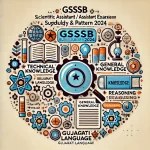Gujarat Gaun Seva Pasandgi Mandal or Gujarat Subordinate Service Selection Board (GSSSB) will going to conduct main recruitment examination for 266 posts of Sub Accountant/Sub Auditor and Accountant, Auditor/ Sub-Treasury Officer / Superintendent. Candidates who will successfully clear the Prelims Exam are eligible to appear for the Main Descriptive Exam.
Understanding the syllabus and exam pattern for the Mains Exam is crucial for effective accountant exam preparation, as it differs from the prelims in both structure and topics of subjects. This article provides a detailed information on GSSSB Accountant & Sub-Auditor Mains Descriptive Exam 2024 Syllabus and Pattern to help candidates in their exam preparation.

Contents
GSSSB Sub Accountant/Sub-Auditor Mains Exam Pattern 2024
The Mains Descriptive Exam is the second stage in the selection process. Unlike the objective-based Prelims, the Mains Exam is designed to test the descriptive and analytical writing skills of the candidates. Key Points of the Exam Pattern:
- Type of Exam: Descriptive (written)
- Mode of Exam: Offline (pen-and-paper)
- Duration: The Exam duration is 3 hours each for Paper-1 and Paper-2.
- Maximum Marks: Both Paper-1 and Paper-2 carries 100 marks each.
- Medium: The exam can be taken in Gujarati or English depending upon the subject.
| Paper | Subject | Marks |
| Paper-1 | Gujarati Language | 50 |
| English Language | 50 | |
| Paper-1 TOTAL | 100 (3 Hours) | |
| Paper-2 | Course Subject | 100 (3 Hours) |
| GRAND TOTAL
(Paper 1 & 2) |
200 |
The descriptive nature of the exam demands proficiency in writing, precise explanations, presentation skills, and the ability to elaborate on topics clearly. Time management is very essential, as candidates will need to write long-form answers within a limited period of time.
Important Links
- Must See: GSSSB Sub Accountant/Auditor Prelims Result 2024 & Expected Cut Off Marks
- For Account / Auditor Final Answer Key 2024: Click Here
- Latest GSSSB Updates:- https://4syllabus.in/tag/gsssb
- For Latest Government Jobs in Gujarat:- https://4syllabus.in/tag/gujarat/
- Official GSSSB Website:- https://gsssb.gujarat.gov.in
Gujarat Accountant/Auditor Mains Paper-1 Syllabus
The syllabus for the Mains Descriptive Exam is more in-depth than the Prelims and covers a broad range of subjects. Below is a breakdown of the topics: GUJARATI LANGUAGE:-
- નિબંધ: ત્રણ પૈકી કોઈ પણ એક પ્રશ્નોની વિગત (વર્ણનાત્મક/વિશ્લેષણાત્મક/ચિંતનાત્મક/સાંપ્રત સમસ્યા પર આધારિત) (આશરે ૨૫૦થી ૩૦૦ શબ્દોમાં). (15 Marks)
- સંક્ષેપીકરણ : આપેલા ગદ્યખંડમાંથી આશરે 1/3 ભાગમાં સંક્ષેપ કરો અથવા સારલેખન: 1/5 ભાગમાં કરો. (05 Marks)
- પત્રલેખન : (ઔપચારિક અને અનૌપચારિક) અથવા અરજીલેખન(આશરે 100 શબ્દોમાં). (05 Marks)
- ચર્ચાપત્ર : (વર્તમાનપત્રમાં પ્રજાના પ્રશ્નો/સાંપ્રત સમસ્યાઓ/વ્યક્તિગત અભિપ્રાય રજૂ કરતું ચર્ચાપત્ર) (આશરે 200 શબ્દોમાં). (10 Marks)
- અહેવાલ લેખન (આશરે 200 શબ્દોમાં). (10 Marks)
- ભાષાંતર : અંગ્રેજીમાંથી ગુજરાતીમાં અનુવાદ. (05 Marks)
ENGLISH LANGUAGE:-
- Essay (A minimum of 250 words and a maximum of 300 words) Choose any one topic from a list of three (Descriptive analytical / philosophical / based on current affairs). (15 Marks)
- Letter writing (in about 150 words) A formal letter expressing one’s opinion about an issue. The issue can deal with daily office matters / a problem that has occurred in the office / an opinion in response to one sought by a ranked officer / issues pertaining to recent concerns, etc. (05 Marks)
- Report writing (in about 200 words) A report on an official function / event / field trip / survey etc. (10 Marks)
- Writing on visual information (in about 150 words) A report on a graph / image / flow chart / table of comparison / simple statistical data etc. (10 Marks)
- Précis Writing A précis in about 100 words for a 300-word passage. (05 Marks)
- Translation: Translation of a short passage from Gujarati to English. (05 Marks)
GSSSB Auditor & Accountant Main Paper-2 Syllabus
- Financial Accounting:- Basic accounting concepts, principles– assumptions, types of accounts and their rules, process of accounts, trial balance, final accounts, rectification of errors and bank reconciliation statement, partnership accounts – admission, retirement, death and dissolution, Company’s accounts, financial statements, issue and forfeiture of shares, accounts of underwriting commission and valuation of goodwill and shares as per Companies Act ,2013. Indian Accounting Standards (Ind AS). (15 Marks)
- Cost Accounting:- Concept of Cost, Types of Cost, Classification of Cost, Cost Centres, Cost Accounting and Cost Ascertainment; Fixed, variable and Semi-variable Cost, Direct Material, Direct Labour, Direct expenses, Overhead Costs, Prime Cost, Factory Cost, Production cost, Sales cost; Stock sheet, Different methods of Costing: Unit Costing, Process Costing, Batch and job Costing, Service Costing. (10 Marks)
- Management Accounting:- Methods of financial statement analysis, marginal cost and break-even analysis, decision making, proportional cost, budgetary control, types of budget, cash budget, flexible budget and zero-base budgeting. (10 Marks)
- Income Tax Act and Goods and Services Tax (GST):- Basic concepts, tax incidence, Definitions in Income Tax Act, 1961, exempted Incomes, Residential Status, Computation of Taxable Income under various Heads, Deductions and Reliefs, Computation of Taxable Income of Individuals and Firms, Deductions of Tax, Filing of Returns, Different Types of Assessment, defaults and penalties, tax planning, tax evasion and tax avoidance. Concept of GST, Structure of GST, GST Council, Provisions regarding compensation to the State, Registration; Implementation and collection of GST: taxable event, supply of goods and services; Place of Supply: Intra- State, Inter-State, Import and Export, Time of Supply, Calculation of GST, Rules of Calculation, Exemption from GST, Composite and Mixed Supply, Tax Credit; Goods and Service Tax Laws. (15 Marks)
- Auditing:- Meaning and Basic Elements of Auditing, Features, Objectives, Types, Advantages, Internal Control, Statutory Auditor: Appointments, Qualifications, Rights and Duties; Vouching – Meaning and objectives, types, duties of the auditor regarding valuation of assets and liabilities. Company audit and related provisions of Companies Act 2013, auditor’s report and certificate, tax audit, duties of auditor regarding profit distribution and depreciation, investigation, audit programme. (10 Marks)
- Economics and Financial Administration:- Introduction to economics, demand, supply and its relative value, concepts of income and expenditure, national income, inflation, economic reform policies, finance commission, capital disinvestment; monetary and fiscal policies, public debt, budget – types and form, budgetary process, public accounts and audit, budget as a political instrument, the role of the Comptroller and Auditor General (CAG), NITI Aayog. (15 Marks)
- Statistics and Mathematics:- Data collection and analysis, measures of central tendency and measures of dispersion, sampling and methods of sampling, probability, index numbers, correlation, constant correlation, regression time series, statistical quality control, function, continuity, limit, Derivatives, permutation and combination. (15 Marks)
- Management and International Business:- Nature and importance of management, principles of management, functions of management, motivation and leadership; Introduction to international business, promoting factors, advantages and limitations; Foreign exchange, Balance of payments and methods to correct disequilibrium, India’s Foreign Trade Policy; International Organisations: WTO, World Bank, IMF, IFC, IDA, ADB. (10 Marks)
Final Words
The GSSSB Sub Accountant/Sub-Auditor Mains Descriptive Exam 2024 requires a different approach than the prelims. Candidates must focus on understanding concepts in-depth and developing their writing skills. By following a structured preparation strategy, practicing descriptive answers, candidates can enhance their chances of success in this crucial main stage of the selection process. Best of Luck.
Frequently Asked Questions:
Is the GSSSB Sub Accountant/Auditor Mains Exam objective or descriptive?
It is descriptive.
How many marks are assigned to each section in the Mains exam?
100 marks for each paper.
Is there any negative marking in the Mains exam?
No, it is descriptive so no negative marking.
What is the duration of the GSSSB Sub Accountant/Auditor Mains Exam?
3 hours each for both paper 1 and 2.







